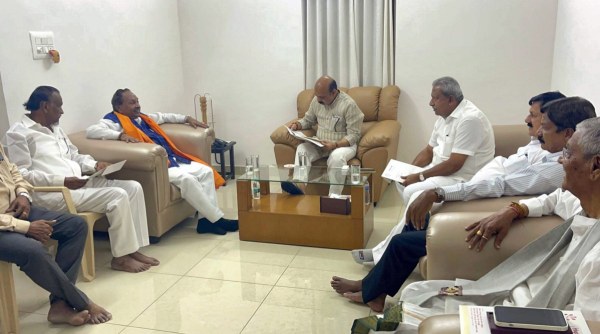
Sources in the party said the delay in getting Eshwarappa to resign was because a section in the BJP was defending him, claiming that forcing out the minister would hurt the party as he is a prominent Other Backward Class (OBC) leader.
Story continues below this ad
Talking about the developments leading to the resignation, a party functionary told The Indian Express, “The protectors of Eshwarappa in different positions in the party presented the view that he is the tallest leader of the OBC community in Karnataka and that if he is ousted the vote bank would be lost. They were creating confusion. It was a futile exercise to hide Eshwarappa behind the OBC vote bank. They tried to convince the high command that the party will lose support.”
 Karnataka CM Basavaraj Bommai with Minister K Eshwarappa (L) at his residence in Bengaluru, Friday, April 15, 2022. (PTI Photo)
Karnataka CM Basavaraj Bommai with Minister K Eshwarappa (L) at his residence in Bengaluru, Friday, April 15, 2022. (PTI Photo)
The factionalism in the saffron party goes back at least two decades when a rivalry developed between Lingayat strongman BS Yediyurappa and Brahmin leader HN Ananthkumar, who had strong central connections.
Though the two set aside their feuding to lay the foundation of the party’s rise to power for the first time in south India in 2008, their discord hampered governance and the Yediyurappa administration between 2008 and 2013 was plagued with allegations of corruption and ineffectiveness.
The internecine battle for supremacy led to the arrest of Yediyurappa for corruption in 2011 and his exit from the BJP the following year. The former chief minister went on to form the Karnataka Janata Party (KJP).
Story continues below this ad
After Narendra Modi and Union Home Minister Amit Shah ascended to power in Delhi and following Ananthkumar’s death in 2018, Yediyurappa managed to briefly re-establish his hold in the Karnataka BJP. But he fell out of favour with the central leadership in the run-up to the 2018 Assembly polls.
But, in the meantime, party insiders said that BL Santhosh, a former Rashtriya Swayamsevak Sangh (RSS) pracharak who was appointed the BJP’s national organisation secretary in 2019, emerged as a counterweight to Yediyurappa’s influence.
 Eshwarappa arrives to submit his resignation to the Karnataka Chief Minister, in Bengaluru, Friday, April 15, 2022. (PTI Photo/Shailendra Bhojak)
Eshwarappa arrives to submit his resignation to the Karnataka Chief Minister, in Bengaluru, Friday, April 15, 2022. (PTI Photo/Shailendra Bhojak)
Yediyurappa was the chief minister between 2019 and 2021. The exit of a minister from his government in March 2021 was partially linked in political circles to internal rivalries in the BJP. The minister had claimed to be a “kingmaker” who could decide the future chief minister.
Yediyurappa stepped aside soon after and ensured fellow Lingayat leader Bommai took over the helm of the state.
Story continues below this ad
BJP leaders said Eshwarappa had been projected as someone who could take on Yediyurappa even though he finished third in Shivamogga — where both were born — in the 2013 state elections behind a KJP candidate. In 2021, Eshwarappa wrote a letter to the state’s Governor to allege misgovernance in the award of road-contract projects under the rural development and panchayat raj department. Yediyurappa was still the chief minister at the time.
Liz Mathew adds: Two BJP leaders from Karnataka said the faction opposing Eshwarappa’s resignation even tried to convince party national president JP Nadda and Shah about the potential blowback of such a move in next year’s state elections.
But after party general secretary Arun Singh, the central functionary in charge of Karnataka, talked to several leaders, the BJP leadership made it clear that Nadda would not like to “face embarrassing questions from the media during his visit to the state” for a state executive meeting on Saturday and Sunday. A state leader said the leadership “minced no words to convey to the minister that he has to put in his papers”.
A party functionary said Eshwarappa’s move to delay the resignation damaged the BJP deeply and did not go down well with the top leadership.
Story continues below this ad
“His public statement that he would not quit has, in fact, come after the central leadership as well as the chief minister told him that it would be better for the party if he resigns. But he somehow had the feeling that his OBC leader status would make it difficult for the party leadership to drop him a year ahead of the elections. The BJP, especially the current leadership, does not appreciate such indiscipline and blackmailing tactics,” said a senior leader familiar with developments in the Karnataka unit.



 Karnataka CM Basavaraj Bommai with Minister K Eshwarappa (L) at his residence in Bengaluru, Friday, April 15, 2022. (PTI Photo)
Karnataka CM Basavaraj Bommai with Minister K Eshwarappa (L) at his residence in Bengaluru, Friday, April 15, 2022. (PTI Photo) Eshwarappa arrives to submit his resignation to the Karnataka Chief Minister, in
Eshwarappa arrives to submit his resignation to the Karnataka Chief Minister, in 





























